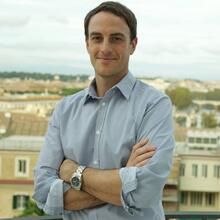When I was studying theology in my early 20s, I had to read the Catholic “mystics.” I say “had to” because I had no particular interest in our mystical or contemplative tradition at the time—a tradition of penetrating self-reflective prayer as a means to meet God. As a young man, I was first drawn to theology as an intellectual exercise, a compelling historical narrative and an impulse to build human fraternity and work for justice.
I struggled through Origen, Augustine, Bonaventure, Thomas Kempis, Theresa of Ávila and John of the Cross. At one point, my professors and other influential people in my life encouraged me to read Thomas Merton’s autobiography The Seven Story Mountain. I hated it. I found it exhaustively boring, and, though the book recounts his quest for meaning and purpose as a young man, I couldn’t relate to his experience in the slightest.
Ten years later, I decided to give it another go. I couldn’t put it down. Yes, there are long, detailed sections of the book about his life that seem superfluous, but then suddenly he offers a deep spiritual insight that makes the previous 50 pages worth it. Today, when people ask me about my Catholic faith, I start with the mystics.
What changed? I changed. I was a little bit older, wiser and more self-reflective. I had a wealth of experience working as a Catholic journalist: meeting popes and other fascinating people from around the world, covering events like the synods of bishops and the 2013 conclave. These experiences opened my eyes to the complexities of our church and our tradition. I learned that there are very real and serious disagreements among us. I no longer held idealistic views about the institution we love and call home. I learned that the church is made up of sinners as well as saints. I realized how long a journey I’d made, but even more importantly, how far I still had to go. I could appreciate St. John XXIII’s pastoral attitude: “See everything, overlook a great deal, correct a little.”
The synod secretariat has gone to extraordinary lengths to encourage each member into a disposition of openness so that maybe, just maybe, the Holy Spirit can act.
The great mystics are people who changed. Because I had changed, I could see a bit of my own experience in their interior journeys. Jesus’ call to “Repent, and believe in the Gospel” (Mk 1:15) means “change your mind” or change your way of looking at life. Change is the way of the disciple. As Cardinal John Henry Newman wrote, “To live is to change, and to be perfect is to have changed often.”
A similar awakening is happening here in Rome at the Synod on Synodality. The major development at this synod is that it’s been structured for listening. Not only is there an unprecedented “climate of prayer,” but the bishops and other delegates have been given a methodology for their discussions called “conversation in the Spirit.” For the first time, synod members are sitting at round tables—not in hierarchical order—at which they take equal turns speaking without interruption, pausing for silence, prayer and personal reflection, and then responding to what has been said with the aim of discerning what the Spirit is calling for from within the group.
This methodology is so structured and intentional that it practically forces the members to be open to conversion. Of course, authentic conversion cannot be forced, but it’s important to understand the extraordinary lengths to which the synod secretariat has gone to encourage and accompany each member into a disposition of openness so that maybe, just maybe, the Holy Spirit can act. The degree to which the members buy in to this process and allow themselves to be changed by what they hear from other delegates and the entire people of God articulated in the instrumentum laboris will determine the “success” of this synod. As my colleague, Gerry O’Connell, told us on the “Jesuitical” podcast, “The litmus test for this synod is if there is a conversion among the members.”
I don’t know if any of the members of the synod like to read the mystics. It’s possible that some members would find Merton’s autobiography completely unrelatable. But what happened to me over the course of 10 years is being concentrated here in Rome over the course of four weeks. It’s a truly remarkable objective and an even bolder leap of faith. Over the next few weeks, we’ll discover if and how the synod is changing the 365 members sitting inside the walls of the Vatican.







